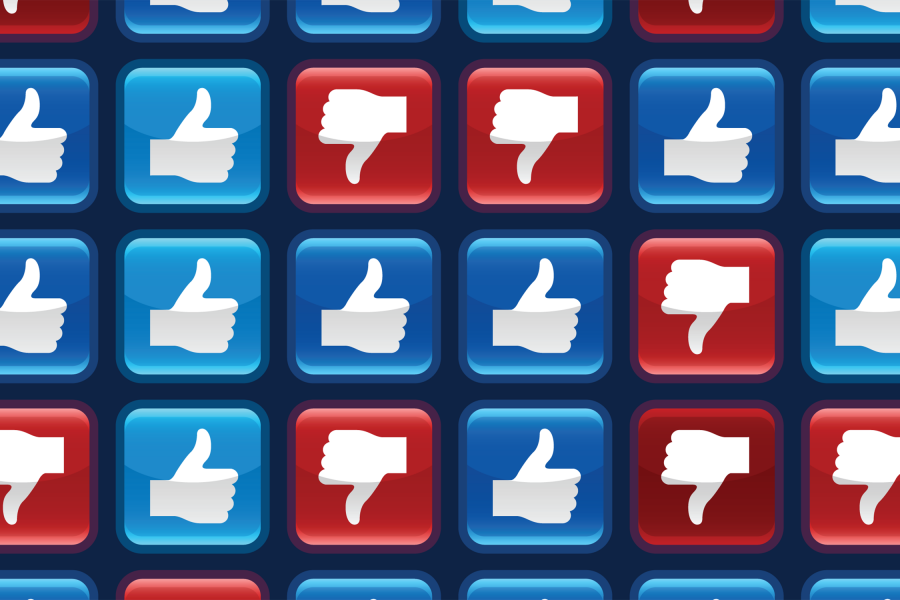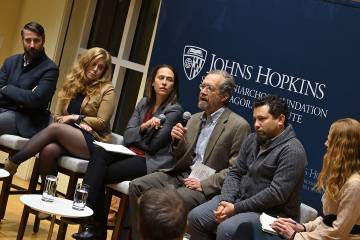Though Americans may be more savvy about disinformation now than they were in 2016, the influences manipulating our media have become more normalized and rampant, a panel of journalists warned during a Johns Hopkins University event Friday.
"Everybody's at it now," said British journalist Peter Pomerantsev, addressing disinformation campaigns impacting U.S. elections—not only from foreign actors including Russia, China, and Iran but also homegrown extremist and religious groups started by "somebody in a basement," he said.
"This is just the new normal. This is why we need different forms of regulation around these issues … and a kind of doctrine of political warfare in the 21st century," Pomerantsev said. "We really have to work out what is our cultural, legal way of making sense of this mess."
New York Times national political reporter Astead Herndon addressed the role that President Donald Trump himself plays in information confusion.
"What we have seen is the biggest barrier for folks, in terms of disinformation on coronavirus or disinformation around our electoral system, is that our most important actor in our political system is the source of it at this moment," Herndon said.
The Stavros Niarchos Foundation Agora Institute at Johns Hopkins hosted Friday's virtual event as part of its Election 2020 series. SNF Agora Visiting Fellow Scott Shane, a former New York Times political reporter, moderated the conversation between Herndon and Pomerantsev, who is a senior fellow at SNF Agora and co-directs the Arena Initiative at Johns Hopkins, which is dedicated to overcoming the challenges of digital-era polarization. Pomerantsev is also author of This is Not Propaganda.
The journalists pointed to investigations of Russian interference in the 2016 U.S. election as a turning point that helped raise awareness of the threat posed by organized efforts to manipulate information.
"It was really the Russian investigation which led to [Mark] Zuckerberg, Twitter, all these people being called to Congress, called to British Parliament," Pomerantsev said. "It's been fantastic in opening up these really important questions around the social media space and how we see this new public sphere."
Unlike in 2016, he said, "we now have a tech sector that promises to look out for this, we have a whole community of investigators and journalists thinking about this."
Herndon also warned of a "willingness for some in America" to ascribe the rise of Trump strictly to foreign intervention. "I think there is a risk of ignoring the very American-born and bred context and issues that have helped him become president," he said.
"Intentional attacks by foreign actors are involved," Herndon continued, but "so are the implicit roles that social media companies play in terms of information. So is the erosion of trust in local media, and news throughout the country. I think these things can all be true at one time."
Shane addressed the factor of conspiracy theories like QAnon. "Why do conspiracies that seem to scream, 'This is bogus,' to most of us and have no evidence to support them travel so far and take such hold?" he asked.
Pomerantsev framed the matter as a quest for identity. "[As] we're all caught up in this churn of innovation that we call globalization and technological change, all identities give way, and people are desperate for new ones," he said. "In a world where left/right definitions have crumbled … where sociological categories have gone, and whole ways of life are disappearing, conspiracies are a new way to create that group identity."
The next webinar in the Election 2020 series, titled "Populism's Second Term", takes place Friday at noon and features Steven Levitsky, a professor of government at Harvard University and co-author with Daniel Ziblatt of How Democracies Die; Sarah Longwell, president and CEO of communications firm Longwell Partners, co-founder of the organization Defending Democracy Together, and chief strategist for Republic Affairs; and moderator Yascha Mounk, SNF Agora Senior Fellow and author of The People vs Democracy: Why Our Freedom is In Danger and How to Save It.
Posted in Voices+Opinion, Politics+Society









